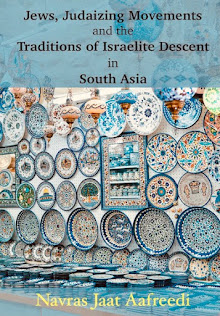Navras Jaat Aafreedi, a professor at Presidency University in Kolkata, is a scholar-activist who constantly champions Jewish Studies in India. He is indefatigable: he organized a multi-site Holocaust film festival, serves as advisor to a student theater group, and travels and speaks widely on several continents. And yes, he also does good scholarship.
His new, small book is notable for its innovative breadth. This work begins with a brief chapter on the well-known and much-studied Kochi (Cochin) Jews, the Bene Israel, and the Baghdadis. It is a reliable summary of work that serves as a fine introduction to the study of Indian Jews.
The second chapter is about Judaizing movements, the relatively remote groups who claim Jewish identity. Aafreedi discusses the B’nei Menashe, tribals along the Indo-Burmese border who about 50 years ago began asserting their claim to Jewishness and have learned Judaism and Hebrew, have synagogues and miqva’ot, and are in the process of making aliyah. He also looks at the B’nei Ephraim, much less well-known than the B’nei Menashe, who live in very humble circumstances in a number of villages and towns in Andhra Pradesh. They try to use Hebrew in daily life as they begin to study about Judaism. And there are also the Chettiars of Tamil Nadu who, like the other two Judaizing movements, came to Judaism via Christianity, and unlike the other two, do not claim Israelite origin. Their movement began in 2011 when about 1,500 congregants of the Zion Gospel Church abandoned Christianity for Judaism under the leadership of a charismatic leader.
Much of the second chapter will be news to many readers, but it is in the third chapter that Aafreedi truly breaks new ground. Here, he explores the theme of non-Jewish groups who claim Israelite descent as well, but have no interest in being considered Jewish. Many of them are Muslim and include the Pathans, about whom Jewish identity has been claimed for more than 100 years, and Kashmiri people who were first identified as Jews in a 9th-century travelogue. Fortunately, Aafreedi reads Urdu and has access to writings unknown outside a few interested people in India. As Aafreedi is himself a Muslim, he also has personal access to the groups he studies. This is the greatest contribution in this work.
India also has Christians who claim Israelite ancestry. Kerala is home to many, most notably the Nazaranis (very much akin to the Mar Thoma, or St. Thomas Christians). These groups claim a 2,000-year history in India, some tracing their origin to the missionary visit of St. Thomas in the first century.
Chapter 7, “Jewish-Muslim Relations in South Asia,” is fascinating. Again, Aafreedi has marvelous access to his sources.
The chapters on “Synagogues in India,” “Jews in Indian Cinema,” and “Jews in Indian Literature” are interesting. While this material will be new to many readers, to those more knowledgeable will find little new material. The final chapter, “Indian Jewry in Israel,” mostly surveys work by Joan G. Roland and Joseph Hodes, but makes a fine capstone for the book.
Author's bio: Nathan Katz is Distinguished Professor, Emeritus, at Florida International University, where he was Director of Jewish Studies, the Bhagwan Mahavir Professor of Jain Studies, Kaufmann Professor of Entrepreneurship, Founding Director of the Program in the Study of Spirituality, and Founding Chair of the Department of Religious Studies. Currently, he serves part-time as Academic Dean of the Chaim Yakov Shlomo College of Jewish Studies, an Orthodox rabbinical school in Surfside, FL, and serves on the faculties of Sivananda Yoga Ashram Resort on Paradise Island, Bahamas, and Hindu University of America in Orlando, FL.
Author's bio: Nathan Katz is Distinguished Professor, Emeritus, at Florida International University, where he was Director of Jewish Studies, the Bhagwan Mahavir Professor of Jain Studies, Kaufmann Professor of Entrepreneurship, Founding Director of the Program in the Study of Spirituality, and Founding Chair of the Department of Religious Studies. Currently, he serves part-time as Academic Dean of the Chaim Yakov Shlomo College of Jewish Studies, an Orthodox rabbinical school in Surfside, FL, and serves on the faculties of Sivananda Yoga Ashram Resort on Paradise Island, Bahamas, and Hindu University of America in Orlando, FL.
- Journal of Indo-Judaic Studies, No. 16, 2018, p. 80.







.jpg)


















No comments:
Post a Comment